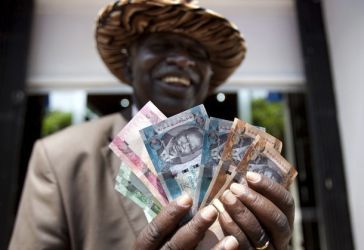South Sudan’s anti-corruption body running short of cash
February 4, 2013 (JUBA) – Austerity measures have left South Sudan’s Anti-Corruption Commission (SSACC) short of money and having to cut back its activities investigating graft in the young nation.

To cope with the dramatic decrease, the commission has stopped recruiting any new staff to add to its 126 employees, which are spread across South Sudan’s 10 states.
Some trips outside South Sudan by members of staff have also been shelved. Austerity measures across the South Sudanese government were triggered when the country stopped exporting oil a year ago due to a transit fee dispute with Khartoum, resulting in the government loosing 98% of its income.
South Sudan claims that Sudan confiscated $815 million worth of its crude oil and the stand-off has still not been resolved, with Khartoum demanding that border security issues be addressed first.
The austerity measures have “affected most of our work and activities seriously. It has reduced most of our plans,” Gatwech said.
Official reports of corruption received by the commission fell from 150 in 2011 to only 32 in 2012 – a 79% drop.
The chairperson said that the decrease was largely due to increased public awareness about what constitutes the evidence and facts needed to make an allegation against an official.
Despite the decrease in new alleged cases, Gatwech warned that the institution’s fight against corruption is “likely to be affected by budget constraints”.
The official did not say whether his institution would consider appealing for funds from international institutions and donors, but said it would be beneficial if the commission receives extra funds immediately so that it can carry out important functions, including public awareness and education.
The chairperson of the SSACC was elevated to the status of a minister before he was appointed. Gatwech was appointed in November 2011, replacing Pauline Riak, with the head of the human rights commission also promoted to the cabinet at the same time. These elevations have made changes in personal emoluments, especially in benefits and privileges, but not in the policy programs of institutions.
However, Gatwech insists that there have been major improvements since he took office, including making all official post holders declare their assets.
During his tenure as head of the commission, the chairperson says that $60 million was recovered by officials anonymously returning stolen funds. The SSACC has now established offices in every state, he said.
Gatwech says he has investigated five high profile cases of corruption and transferred them to the ministry of justice, which is responsible for prosecuting suspects.
Since 2005, when former rebels the Sudan People’s Liberation Movement (SPLM) formed a government in South Sudan as part of a peace deal, no official has been prosecuted for corruption despite graft being widespread.
South Sudan gained independence in 2011 but in June 2012 the young nation was rocked when a leaked letter from president Salva Kiir to 75 top officials asked them to return $4 billion in missing government funds. Kiir set up a bank in Nairobi, Kenya for money to be anonymously returned.
The highest profile corruption case in South Sudan ended in March 2012 when a court in Juba acquitted the SPLM’s secretary-general Pagan Amum Okiech, of receiving a $30 million corrupt payment in 2006.
The country’s former minister of finance, Arthur Akuien Chol, had alleged that he had received orders from “above” to transfer the public money to Amum’s account.
But Gatwech was keen to emphasise the progress made since he came to office, including the return of some funds which had gone missing in Lakes state.
An audit of the commission’s work covering the period of 2006 and 2007 found that the institution had overspent, but this has since been addressed according to the government.
Gatwech told Sudan Tribune that the SSACC’s budget in 2006 was SSP 168,045, with this increasing to SSP 2,300,000 in 2007.
(ST)
